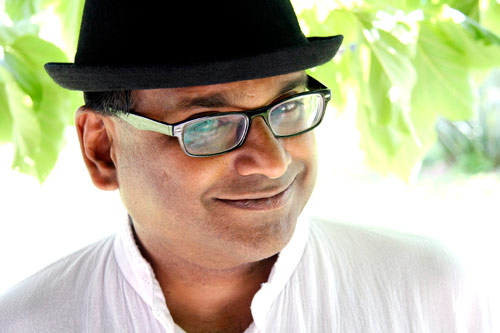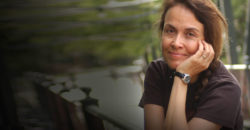Poet, essayist, and translator Indran Amirthanayagam was born in Colombo, Ceylon (now Sri Lanka). He was raised in Sri Lanka, London, and Honolulu. Amirthanayagam has authored ten poetry collections, including The Elephants of Reckoning (1993), Ceylon, R.I.P. (2001), The Splintered Face (2008), and Uncivil War (2013). He writes, translates, and publishes poetry and essays in English, Spanish, French, Portuguese, and Haitian Creole. In a review of The Splintered Face, Jennifer Garfield described how “Amirthanayagam’s poems achieve a devastating intimacy that necessarily dissolves the separation between countries and peoples. … His rhyme and cadence are gentle and disarming, and the muscle of his poetry lies in its initial passivity, mimicking the helplessness of both the living dead and the simply living.”
Amirthanayagam’s poems have won a Paterson Poetry Prize and a Juegos Florales. His writing has appeared in the New York Times, the Kenyon Review, the New England Review, BOMB, Siempre, La Gaceta, and other magazines. A US diplomat, Amirthanayagam has lived in several countries, including Haiti, Belgium, Argentina, and the Republic of Côte d’Ivoire.
Face
Imagine half your face
rubbed out yet
you are suited up
and walking
to the office.
How will your mates
greet you?
with heavy hearts,
flowers,
rosary beads?
How shall we greet
the orphan boy,
the husband whose hand
slipped, children
and wife swept away?
How to greet
our new years
and our birthdays?
Shall we always
light a candle?
Do we remember
that time erases
the shore, grass
grows, pain’s
modified?
At Hikkaduwa
in 1980 I wrote a ditty,
a sailor’s song
about rain
in sunny Ceylon.
I don’t know
what Calypsonians
would compose
about this monstrous
wave, this blind hatchet man;
don’t know
the Baila singers’ reply;
we are a “happy and
go” people
yet the fisherman’s wife
knows
that her grandfather
was eaten by the ocean—
fisher communities
have suffered in time
and what’s happened
now is just another feast
for that bloody,
sleeping mother
lapping at our island;
but what if the ocean
were innocent,
the tectonic plates
innocent, what if God
were innocent?
*
I do not know
how to walk upon the beach,
how to lift corpse
after corpse
until I am exhausted,
how to stop the tears
when half my face
has been rubbed out
beyond
the railroad tracks
and this anaesthetic,
this calypso come
to the last verse.
What shall we write
in the sand?
Where are gravestones
incinerated? Whose
ashes are these urned
and floating through a house
throttled by water?
Shall we build
a memorial
some calculated distance
from the sea, in a park,
in the shape of a giant wave
where we can write
the names of the dead?
Has the wave lost
its beauty? Is it now
considered obscene?
*
Yet tomorrow
we must go to the ocean
and refresh ourselves
in the sea breeze
down in Hikkaduwa
where it is raining
in sunny Ceylon.
Tomorrow, we must
renew our vows
at sunrise, at sunset.
Let us say the next time
the ocean recedes
and parrots gawk
and flee, and restless
dogs insist their humans
wake up, we will not peer
at the revelation
of the ocean bed,
nor seek photographs.
We will run to higher ground,
and gathered there
with our children,
our cats, dogs,
pigs, with what we’ve
carried in our hands
—albums, letters—
we will make a circle,
kneel, sit,
stand in no particular
direction, pray
and be silent,
open our lungs
and shout thanks
to our gods
thanks to our dogs.










